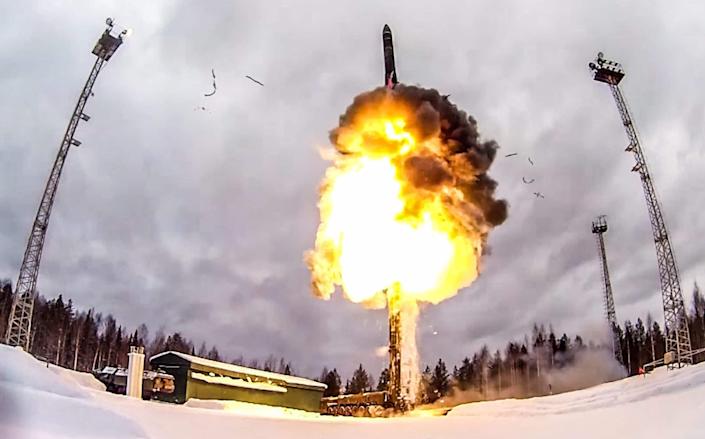
Vladimir Putin may be preparing a cyber assault on British interests, the Home Secretary and GCHQ warned as they urged companies and public services to take “pre-emptive measures” to defend themselves against an attack.
Writing for The Telegraph, Priti Patel said that “as this crisis develops” the Government expects to see “cyber attacks aimed at the West”.
In a separate article, Lindy Cameron, the head of GCHQ’s National Cyber Security Centre (NCSC), warned of a “heightened cyber threat” and said: “Cyber attacks do not respect geographic boundaries.”
Britain is seen to be a potential target, having taken a leading role in calling out Mr Putin’s aggression and threatening severe consequences in the event of an invasion.
In recent days, Jeremy Fleming, the GCHQ director, has briefed the heads of organisations involved in the UK’s critical national infrastructure – such as utility, communications and food companies – to strengthen their cyber defences in the light of increasing tensions over Ukraine.
The public interventions by Ms Patel and GCHQ came after Boris Johnson warned of a “moment of extreme danger for the world” during a speech in Munich on Saturday in which he said Russian plans to invade Ukraine appeared to be “in motion”.
In other developments:
[embedded content]
-
Volodymyr Zelensky, the Ukrainian president, called for sanctions threatened against Mr Putin to be imposed immediately, asking Western allies: “What are you waiting for?”
-
Officials were preparing for the possibility of more British energy firms going bust if gas prices rise even further because of the turmoil.
-
Liz Truss, the Foreign Secretary, said the West must not “sell out” Ukraine by making concessions on its sovereignty to Russia.
-
Ben Wallace, the Defence Secretary, was leading an effort to expose Kremlin disinformation about its military activity, having pulled out of the Munich conference to focus on the plans.
The warnings by Ms Patel and Ms Cameron highlight the level of concern in Whitehall about the prospect of British organisations being targeted by the Kremlin.
On Friday, the Foreign Office published a NCSC assessment that it was “almost certain” that the GRU, Russia’s military intelligence service, was involved in “denial of service” attacks on two banks in Ukraine last week.
While Ms Cameron said there was currently no evidence of the UK being specifically targeted, she wrote: “The UK is closer to the crisis in Ukraine than you might think … If the situation continues to escalate, we could see cyber attacks that have international consequences, intentional or not.”
Mr Johnson hinted at the threat in his speech in Munich, saying: “This crisis extends into every domain, which is why the UK is providing Nato with more land, sea and air forces.
“And it is because we feared a crisis like this that we were already engaged in the biggest increase in defence investment for a generation, spread across conventional capabilities and the new technologies that are ever more important to our collective defence.”
Ms Patel warned: “We are already seeing an escalation of Russian information operations clearly intended to provide a pretext for military action against Ukraine, and we should expect to see more of this as the crisis develops, including information warfare and cyber attacks aimed at the West.
“The UK Government Information Cell has brought together our counter-disinformation expertise to identify and tackle Russian information aggression targeted at the UK.
“Any conflict in Ukraine would not just be a foreign quarrel about which we know little. Its effects would be felt here too. In recent weeks, this has included reports of malicious cyber incidents in Ukraine which bear the hallmarks of similar Russian activity.
“Our National Cyber Security Centre has confirmed that past Russian cyber activity has included attempted interference against UK media, telecommunications and energy infrastructure, and cyber criminals in Russia have targeted well-known firms in recent high-profile attacks.”
On Saturday, footage released by the Russian government showed Mr Putin and Alexander Lukashenko, the Belarusian president who has promised to support Russia in the event of a war with Ukraine, watching the launch of intercontinental and hypersonic ballistic missiles on screen in the Kremlin’s situation room.
The drills, held annually but usually carried out in autumn, also saw tactical and short range cruise missiles fired from ships, aircraft, and ground-based launchers.
They included the 300-mile ranged Iskander M, large numbers of which have been deployed with a suspected Russian invasion force inside Belarus. The Kremlin said in a statement that all the missiles had hit their targets.
[embedded content]
It came as at least two Ukrainian soldiers were killed on a third day of intensifying artillery attacks across the line of contact in eastern Ukraine.
Ukraine’s defence ministry said its positions were attacked 70 times throughout the day. One soldier was killed in an early morning attack and another later in the day. Officials in Kyiv described it as an attempt to provoke a response that could serve as a pretext for a Russian attack.
It said troops had summoned Organisation for Security and Co-operation in Europe observers to document the attack and asked for a ceasefire rather than open fire in response.
A delegation of Ukrainian MPs including the interior minister came under fire in the afternoon as they visited Ukrainian troops and civilians near the front line.
Russia’s FSB security service claimed at least two shells fired across the Ukrainian border landed in the Rostov region, one of which destroyed a building. Russian investigators said they were opening a criminal case.
Mr Zelensky dismissed the claims as “lies” while Dmytro Kuleba, the Ukrainian foreign minister, “absolutely refuted” it and demanded that an international fact-finding mission investigate.
Earlier in the day, pro-Russian separatist authorities in Donetsk and Luhansk ordered “full mobilisation” of the population in preparation for war.




